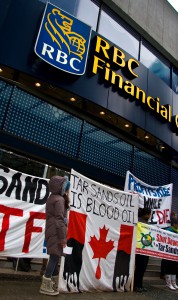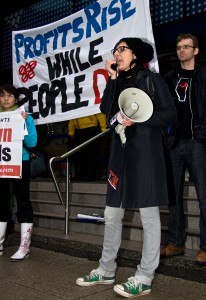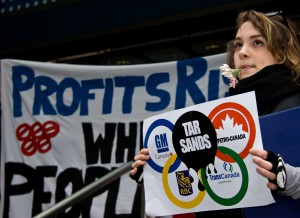
On Saturday February 13th at 3:00 p.m. dozens rallied outside of RBC’s main branch in Vancouver (1025 West Georgia St) to protest the Olympic sponsor’s record as the top financier of the Alberta tar sands, an affront to Indigenous rights and the nation’s fastest growing source of water pollution and greenhouse gas emissions. This rally was coordinated with the combined efforts of the Rainforest Action Network, Council of Canadians and the Indigenous Environmental Network.
The protest is the latest in a yearlong campaign to convince RBC to meet industry-best environmental and social standards. Participants view RBC’s efforts to enhance its reputation through its $110 million (CAD) sponsorship of the Olympic games as incompatible with its significant financial support of Canada’s most polluting industry. According to Bloomberg, RBC has led underwriting for over $16.9 billion (USD) in lending to companies operating in the tar sands since 2007—more than any other bank around the globe.

Representatives from several First Nations impacted by tar sands developments led the rally. Speakers included First Nations from the Cold Lake Region, Lubicon Cree First Nation, Wetsuweten First Nation, and the Athabasca Chipewyan First Nations. The representatives brought forward stories of the impacts of the tar sands and tar sands infrastructure on Indigenous rights, treaties and livelihoods. In addition, we were very grateful for special speakers including Macdonald Stainsby of Oilsands Truth and Clayton Thomas Muller of the Indigenous Environmental Network.
The toxic burden of the tar sand’s disproportionally impacts Canada’s First Nation’s communities, yet RBC refuses to recognize international standards for Indigenous rights. By bankrolling the tar sands, RBC is mortgaging Canada’s clean energy future and jeopardizing the health of all Canadians.
“The Royal Bank of Canada is being put on notice, our network will not stop until RBC adopts a socially responsible banking policy that does not include investments in dirty fossil fuels like Canada’s tar sands,” says Clayton Thomas-Muller, Indigenous Tar Sands Campaigner of the Indigenous Environmental Network. “RBC must respect Indigenous Peoples right to Free, Prior and Informed consent on all investments impacting our lands, culture and rights.”

“The Royal Bank of Canada, a National Partner for the 2010 Games, is directly involved in the Alberta tar sands, one of the most environmentally destructive projects in the world,” says Council of Canadians Prairies Regional Organizer Scott Harris. “The Royal Bank is a major financier of tar sands projects and is also a sponsor of the Torch Relay. Ironically, their ad campaigns for the relay ask individuals to make a “green pledge” by volunteering to carry the torch.” The Council of Canadians is campaigning for a tar sands free future, which includes no new approvals in the tar sands and a halt to any development infrastructure designed to increase the capacity of tar sands exploitation.”

Mining oil from tar sands requires churning up huge tracts of ancient boreal forest and polluting so much clean water with poisonous chemicals that the resulting waste ponds can be seen from outer space. The health impacts to Alberta’s First Nation communities are severe, with cancer rates up in some communities as much as 400 times its usual frequency. In addition, communities living near oil refineries face increased air and water pollution from tar sands oil, which contains 11 times more sulfur and nickel and five times more lead than conventional oil.
For more information on RBC and the tar sands, visit: http://www.ran.org/tarsands
See how RBC’s tar sands financing stacks up to other banks in our earlier post: “Banks Ranked and Spanked on Tar Sands”











